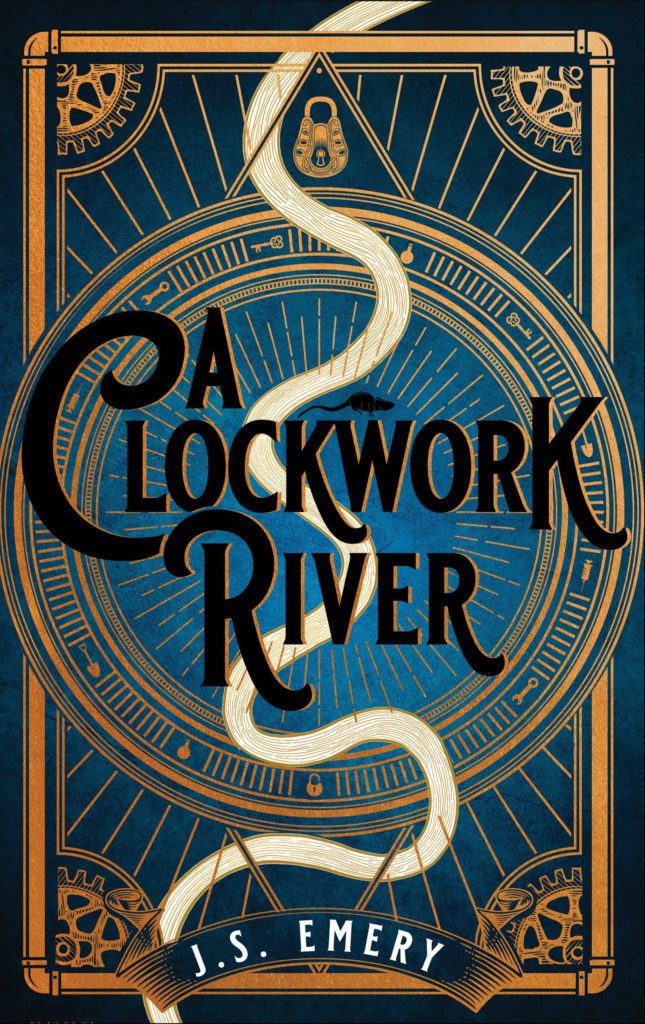
Book info
A Clockwork River by J.S. Emery
Release Date: 14th October, 2021
Page Count: 802
Published by: Head of Zeus, an Ad Astra Book
Head of Zeus
Amazon
Book Depository
Goodreads
Synopsis
A sister searches for her missing brother as a new power rises amid the splendour and the squalor of a once great city. Time is running out for the Clockwork River. Lower Rhumbsford is a city far removed from its glory days. On the banks of the great river Rhumb, its founding fathers channelled the river’s mighty flow into a subterranean labyrinth of pipes, valves and sluices, a feat of hydraulic prowess that would come to power an empire. But a thousand years have passed since then, and something is wrong: the pipes are leaking, the valves stuck, the sluices silted and the once torrential Rhumb has been reduced to a sluggish trickle. The fortunes of the Locke family, descendants of the city’s most celebrated engineer, are similarly reduced. In a once fashionable quarter of the once great city, siblings Samuel and Briony Locke distract themselves: Sam tends to his vast lock collection instead of finishing his engineering thesis; facing the prospect of a disagreeable marriage, Briony occupies herself with alchemical experiments One night Samuel leaves the house carrying five of his most precious locks and doesn’t come back. As she searches for her brother, Briony will be drawn into a web of ancestral secrets and imperial intrigues as a ruthless new power arises. If brother and sister are to be reunited, they will need the help of a tight-lipped house spirit, a convict gang, a tribe of troglodytes, an association of antiques enthusiasts, a traveling theatrical troupe, the Ladies Whist Club, the Deep State, and a lovesick mouse. Epic, rollicking and in love with language, Jacob and Sara Emery’s sprawling debut novel of humble kitchen magics and awe-inspiring civil engineering is a rare and delicious commodity – the world’s first hydropunk novel.
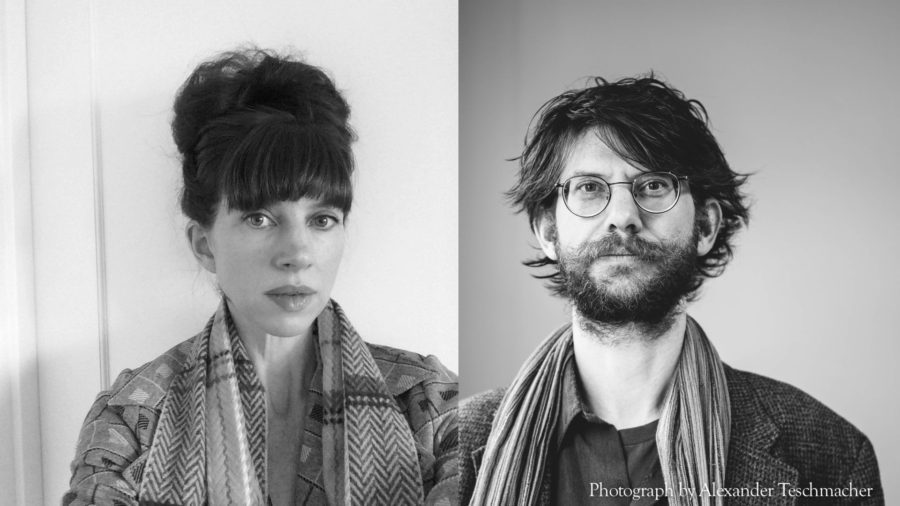
About The Authors
J. S. Emery is a brother-sister writing team, born in North Idaho into a homeschooling family of seven children, each of whom received an air rifle and a copy of The Odyssey by way of a fifth birthday present. This background prepared them wonderfully for writing fantasy novels but very poorly for formal education. After dropping out of secondary school, they worked jobs including ballet dancer, emergency room janitor, and map librarian in various parts of Europe and North America. They now live in the United States, where they are godparents (and, increasingly, dungeon masters) to one another’s children.
Goodreads: https://www.goodreads.com/author/show/21611907.J_S_Emery
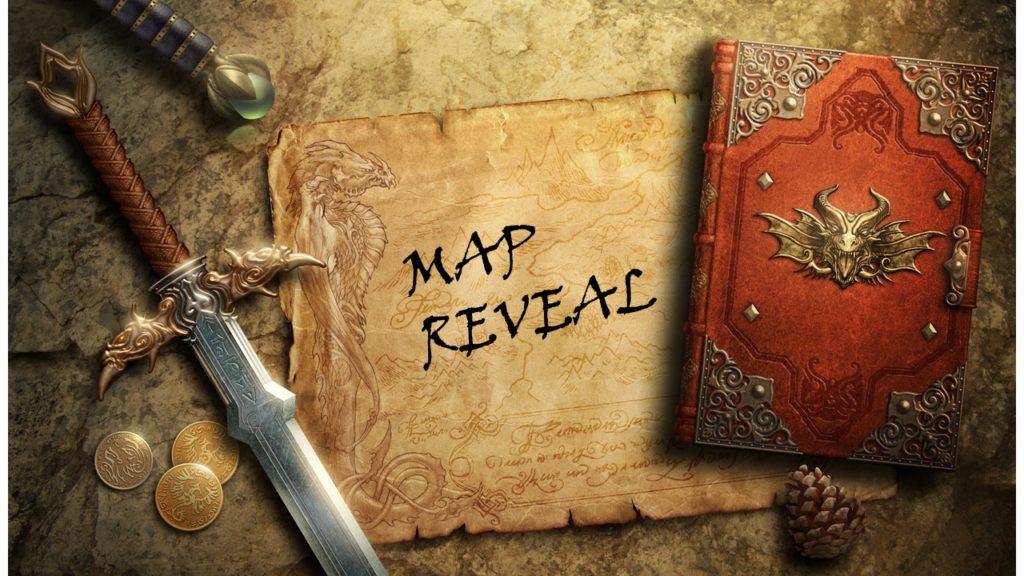
But what about that map, though?
FEAST THINE EYES!
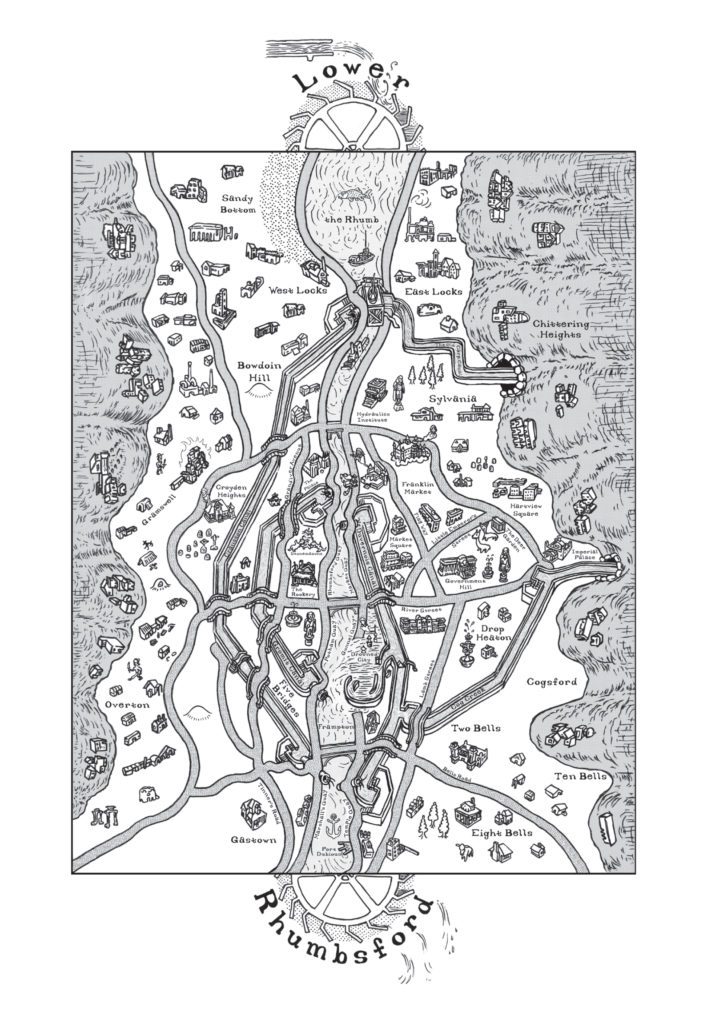
Interview
1. Tell us a bit about yourselves!
As you can read on the inside flap of the book jacket, we are a brother and a sister who have written a novel together. We were raised in a somewhat odd homeschooling family of seven children–Sara the fifth, Jacob the sixth–in the mountains of the Western United States. Neither of us lives in the mountains now, but something of the mountains still lives in us and some people still find us odd. Sara lives in Seattle, where she reads and writes, and writes music and raises kids. Jacob does largely the same things, only he does them in a different time zone, where he is a professor of literature at Indiana University.
2. Can you tell the audience a little more about A Clockwork River?
A Clockwork River is a big sprawling fantasy novel set in a world in which plumbing is a high art quite beyond the capability of ordinary people. Its main characters are siblings Sam and Briony Locke, children of a fallen family whose reduced fortunes mirror those of the city as a whole. Sam has abandoned a promising career in civil engineering to collect antique locks; Briony diverts herself from the prospect of an arranged marriage that might repair the family finances with alchemical experiments. One of the items in Sam’s lock collection happens to be fantastically important and sought-after and people start trying to kill him for it; meanwhile, Briony is obliged to save her brother and the empire through alchemy and social intrigue.
That’s the summary, but it is maybe more important that the novel fuses two great plots of English literature–the picaresque novel of a hapless hero, passing from hand to hand through the great wide world without ever understanding exactly what he is up to, and the gothic novel of a besieged heroine in a gloomy ancestral manse, with sinister constraining forces hedging her ambitions on every side. And all this is a pretext to cram in a great quantity of eccentric characters and shaggy-dog subplots, such as the members of the Lock, Key, and Fob Club, with their extravagant facial hair and a devotion to curios that exceeds their regard for legality; intrigues among the servants, laborers, and bureaucrats who make Lower Rhumbsford go round; the carp herders, tunnel-dwellers, and convict gangs who inhabit the spaces unnoticed by Lower Rhumbsford’s high society; and various long-lost relatives who reveal themselves at inopportune moments.
3. Were there any specific challenges with writing A Clockwork River? How did you find writing as a duo?
During the ten years it took us to write the book we always thought of it as Maxwell’s Demon, in a reference to the 1867 thought experiment about a counterforce to entropy. Readers will recognize this name as closely entangled with the infrastructure of the novel, and even though circumstances obliged us to accept a change of title our greatest challenge remains an inability to refer to the novel as anything other than “the book formerly known as Maxwell’s Demon.”
But really, the mechanics of the writing went more smoothly and pleasurably than either of us could have anticipated, given that we were never living in the same city and often in different countries. At every family gathering we would get together to dream up mad subplots till the wee hours. We worked using shared online documents and zoomed (only we called it “skyping” back then) every few weeks to hash through complications. At the beginning Sara was better at some things and Jacob better at others, but by the end of the book we had more or less learned each other’s tricks and could tag-team from one page to the next across a wide range of styles. Thus the first drafts of the first chapters were mostly written by one or the other of us, but the last chapters, which are also the best ones, were completely collaborative from start to finish.
The most devilish challenges, at least from a compositional perspective, were the ones we set ourselves. For long stretches we were like a couple of cooks proposing preposterous ingredients in order to vex one another. “Here’s a carp!” “Okay, here’s a handful of buckwheat!” “In that case, add in this jar of pomegranate syrup!” “How about a honeydew melon and milk of paradise?” Only instead of buckwheat and pomegranate it was a licentious chambermaid and windmills and a gambling house spirit and all the other oddities that we had stirred into the first half of the novel. And then in the second half we had to process it all into a coherent and delicious entree, which was great fun.
A final tricky bit is that the novel was a private outgrowth of our own love of language and imagination, which we wrote first for one another and then began to share with a few of our closest friends and family. The original document teemed monstrously with in-jokes and lengthy asides and was twice the length of the published version. For example, it contained an entire Jacobean revenge tragedy in four acts, whose footprint we eventually reduced to a few pages. When we decided to rewrite A Clockwork River for the public there were some hard calls–we ended up with a better book by almost every measure, but we hope we retained its animating spirit of self-indulgent enthusiasm, our love of absurdity for its own sake and for cozy overstuffed luxury.
4. Following on from that, how did you start writing together?
We’ve shared writing since we were little tots and accomplished our first collaborative piece when we were very young, maybe six and nine–a historical bodice ripper with lots of suggestive ellipses, in the style favored at the time by our oldest sister. But we started writing together in a concerted and serious and long-term way not long after Sara had her first child and wanted a structured creative outlet as she transitioned into motherhood. We decided to collaborate on a novel and debated for a while whether it ought to be a fantasy novel or a family melodrama. After a bit of back and forth we decided it should be both. That set the precedent for the maxim we wrote by, “Never say no to anything!”
From that point on it was a simple matter of designing a flag, composing a national anthem, and instituting some commemorative holidays. The city of Lower Rhumbsford took shape over a year or two of composing notes; then we began actually writing the thing; then a few hundred pages in, when it began to seem likely that we would finish it, we began to send serialized chapters to our other brothers and sisters and an expanding constellation of friends. Finally, when we had put the period to the last chapter, we thought, “Aha! If we rewrote this, perhaps people who are not related to us would want to read it.”
5. What do you think characterizes your writing style?
Joy. Excess, enthusiasm, exuberance. We like writing. We like the right words in the right place. We like setting up a lot of dominoes and watching them go boom together. We like overtaxing sentences to see exactly how much they can take on, in much the same way, we imagine, that Gustave Eiffel liked seeing exactly how many iron girders he could pile one on top of the other without the whole lot toppling into the Seine. We plant oodles of Easter eggs and we’ll take a joke as far as we can, but if you go to the bottom of the well you will find darkness there. We are great confabulators but we never pretend we’re not telling a lavish fantasy story about made-up people. Fiction has advantages that real life can only fantasize about, and if you didn’t think so too you wouldn’t read it.
6. Who are some of your writing influences?
Both of us are voracious, adventurous, promiscuous readers and we’ve picked up bits of all sorts of things from all sorts of places. A Clockwork River has some pretty frank homage to Adam Smith, Angela Carter, and Mervyn Peake. Dickens for the parallel plot construction and Austen for the biting small talk; Tom Fielding and Douglas Adams for the hapless picaresque parts; and Laurence Sterne and Nikolai Gogol for the incompetent narrator who can never quite manage to fade into the woodwork and who keeps breaking crockery when he is trying to hide in the pantry out of the public eye. Tim Powers, John Bellairs, Gene Wolfe, Leo Tolstoy, Fran Ross, Herman Melville, China Mieville, Terry Pratchett, Susanna Clarke, Vladimir Nabokov, John Webster, to name a few more.
Plus Monty Python—we owe a great debt to Monty Python, and not just in the surreptitious quotations that we have smuggled in. The filmmaker Andrei Tarkovsky says somewhere that a shot can be interesting for thirty seconds, becomes boring after a few minutes, and becomes interesting again in a totally different way after looking at it ten minutes longer. Monty Python has taught us the same thing about jokes–that if you keep driving the nail long enough, the joke is transfigured into a more profound and awe-inspiring one.
7. Is there anything else you would like to tell us about yourselves or your work?
We are hip deep in the raging waters of a new novel, set a thousand years before the events of A Clockwork River. It centers on a labor struggle in a mine from which a time-altering ore is extracted and it involves barbarian hordes, interesting religious practices, lots of sword fighting, a great deal of dental surgery, a little bit of axe-fighting, a gang of pint-sized pickpockets, the labor theory of value, and true love. We love circuitous routes and afterthoughts, but we also love a change of pace and, in contrast to A Clockwork River, the new novel will be sleek, taut, and packed with plot events.

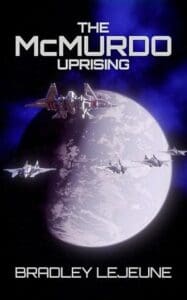
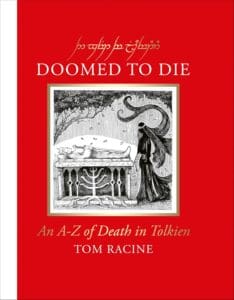
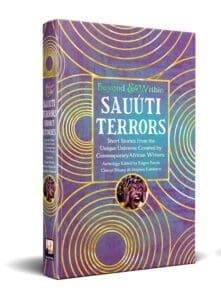
This looks good!